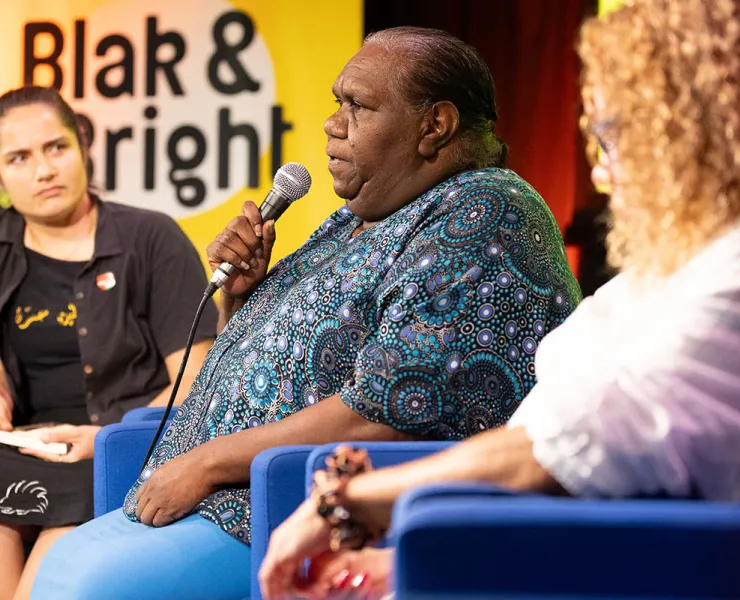Breadcrumb
Elevate: First Nations Storytelling and Literature Fund
Contact
For guidelines or application enquiries, please contact:
Ricky Wighton, Project Manager, First Nations Arts & Culture
Phone: (02) 9215 9162
Key dates
Applications close: Tuesday 2 September 2025, 3pm AEST
Notifications: October 2025
Activities commencing from: Monday 1 December 2025
Amount
A set funding amount of $10,000
Please note: To apply, you must be registered in our application management system a minimum of two business days before the closing date. To create an account, please click on the Apply now link above.
About the opportunity
The Elevate: First Nations Storytelling and Literature Fund is a $10,000 career development grant open to First Nations individuals and groups who are writers, poets, editors, illustrators, journalists, arts workers and groups in the literature sector.
Elevate is designed to support and develop career pathways and opportunities which may include capacity building, networking, mentoring, residencies, and audience development for their work. Projects can take place nationally, internationally, online, or in a combination of in-person and online.
How much can I apply for?
You must apply for the full amount of $10,000.
When can I start my Project?
Your project can commence on or after 1 December 2025, and it must be completed within 1 year of your start date mentioned in your application.
Protocols for Using First Nations Cultural and Intellectual Property (ICIP) in the Arts
If your application involves working with other First Nations artists, arts and culture workers, communities, or subject matter, you must adhere to these Protocols and provide evidence of this in your application and support material. Get more information on the First Nations Protocols.
Eligibility
Who can apply?
You can apply for this grant if you are an:
- Australian First Nations artist, arts and culture worker or group living in Australia
Please Note: You can submit one application for this funding round.
Who can’t apply?
You can’t apply for this grant if you:
- are a First Nations organisation
- are not an Australian First Nations practicing artist, group or organisation
- are the manager or agent of a First Nations artist or group
- are based outside of Australia
- are requesting additional funds to an active project or activity
- are requesting funding to purchase large capital equipment
- have already received funding for the same project from Creative Australia
- have an overdue grant report with Creative Australia
- owe money to Creative Australia for not fulfilling a grant requirement.
What types of projects can I apply for?
Projects can include, but are not limited to:
- short courses and expenses
- masterclasses workshops
- residencies
- mentoring
- national and international conferences or festival attendance.
What can the funding be used for?
Funding can be used for but are not limited to:
- artist’s fees
- editing and/or Publishing costs
- travel and accommodation
- residency fees
- short course fees
- masterclass workshops
- access costs
- Elders' consultations, advice, and guidance protocol fees
- Indigenous Cultural Intellectual Property (ICIP) fees
- material related to delivering your project
- small creative capital costs related to your project
Access Costs
We encourage applicants to ensure that their projects are accessible for everyone. Access costs are a legitimate cost and may include but are not limited to:
- using Auslan interpreters
- captioning
- translation to other languages
- audio description
- temporary building adjustments
- materials in other formats
- specific technical equipment
- carer, or support worker assistance.
- sensory spaces for events and festivals.
Arts Access Organisations in Australia
Below is a list of arts and disability organisations in Australia for you to reach out too regarding access costs:
- New South Wales: Accessible Arts
- Northern Territory: Incite Arts
- Queensland: Access Arts
- South Australia: Access 2 Arts
- Victoria: Arts Access Victoria
- Western Australia: DADAA
Assessment criteria
The First Nations Industry Advisory Panel will assess your application against the three assessment criteria: Project Quality, Project Impact, and Project Viability.
Application responses
Your answers to the Project Quality and Project Impact questions can be submitted as:
- written responses
- video responses
- audio responses.
Your answers to the questions do not need to respond to every bullet point mentioned below; please speak only to the bullet points that are relevant to your project.
Download the Application Help Guide here.
Project Quality
The Industry Advisors may assess your application on the following:
- a clear project vision, process, and outcome
- the capacity to deliver the proposed activities or services
- the evidence of previous past works that support the artist’s artistic and cultural practice and career development
- the skills and ability of artists, arts professionals, collaborators, or partners involved, and relevance to the project
- the evidence of considered pre-consultation engagement with Elders, other creatives, organisations, and communities involved (if applicable).
Project Impact
The Industry Advisors may assess your application on the following:
- the benefits of what the project will have for the artist’s/group’s artistic and/or cultural practice and career development
- how the project will strengthen the skills of the artist/group and/or everyone involved
- the potential to develop new markets, relationships or meet existing market demand
- the extent to which the activity contributes to a sector that is accessible, inclusive and equitable
- why the project is important and relevant to you
- why is the project timely to pursue now
- how the project will benefit cultural expression (if applicable)
Project Viability
The Industry Advisors may assess your application on the following:
- a realistic and achievable timeline, this may include:
- a contingency plan
- COVID-safety plan
- a realistic and achievable budget with a detailed breakdown that may include:
- Artist Standard Rates fees/payments for the applicant artist, key creatives and collaborators, participants, or Elders and/or Cultural Consultants. Please see NAVA Code of Practice – Payment Standards here.
- access costs (if applicable)
- other income such as in-kind support, (optional)
- Travel and Accommodation
- relevant letters of support and/or confirmation from Elders and/or Cultural Consultants, creative team, organisations, Mentors and Communities
- where relevant to the project, evidence that the Protocols for using First Nations Cultural and Intellectual Property in the Arts have been adhered to evidence of appropriate consultation with participants, audiences, or communities
Support material
Support material may include:
- examples of your artistic and or cultural work
- examples of past and current work
- short bios of artist/s and creative team.
- Letters of support/confirmation may include:
- creatives to confirm their support and/or collaboration in the project
- partnerships to confirm their support and/or collaboration in the project
- communities confirm their support and/or collaboration in the project
- First Nations Elders to confirm their support and/or collaboration in the project
- organisations to confirm their support and/or collaboration in the project.
There are four types of support material you may submit:
- Artistic support material
This should include relevant, recent examples of your artistic or cultural work:
- images of previous works
- scripts
- video
- audio.
Please note: Where possible, please ensure support material can be made accessible such as:
- closed captioning
- audio description
- image descriptions for visual material.
- Biographies and CVs
You can include a brief bio and/or curriculum vitae (CV) of the:
- applicant
- key artists/creatives involved in your project
- personnel involved in your project
- other collaborators involved in your project.
Please note: Brief bios or CV information should be presented as a single document no longer than two A4 pages in total.
- Support Letters
- Individuals, groups, or organisations can write letters in support of your project. A support letter should explain how the project or activity will benefit you, other artists or key creatives, personnel, and other collaborators involved, participants, or the broader community.
- If relevant to your activity, letters of support may also provide evidence of appropriate cultural protocols, permissions, or outline the support of key project partners.
- You can include up to five letters of support.
- Letters of confirmation from artists who are involved in the project
- If your application involves an invitation to a residency, to present your work or attend a conference, either nationally or internationally, you must evidence this by providing letters of confirmation.
- Letters of support/confirmation can come from creative involved in your project; this can also include their fees.
- Please provide a single link to all support letters or scan them into one PDF file and attach it to your application.
- You can include up to five letters of confirmation.
Ways of providing your support material
- Our preferred method of receiving support material is via URLs (weblinks).
- You can provide up to three URLs (weblinks) that link to content that is relevant to your project activity. This may include video, audio, images, or written material.
These URLs can include a total of:
- 10 minutes of video and/or audio recording
- 10 images
- 10 pages of written material.
Please note: If you are linking to media files that are private or password protected like Vimeo, please provide the password in the password field on the application form.
Other accepted file formats:
If you cannot supply support material via URLs, you may upload support material to your application in the following formats:
- video (MP4, QuickTime, and Windows Media)
- audio (MP3 and Windows Media)
- images (JPEG and PowerPoint)
- written material (Word and PDF).
Please note: We do not accept application-related support material submitted via post. Application-related material received by post will not be assessed and will be returned to the sender.
If you think you will have difficulty submitting your support material online or need advice on what type of material to submit, please contact:
Ricky Wighton, Project Manager, First Nations Arts & Culture
Phone: (02) 9215 9162
Frequently asked questions (Eligibility)
Is this grant right for me?
The Elevate: First Nations Storytelling and Literature Fund is designed to support the First Nations literature sector’s emerging and mid-career artists and groups who are writers, poets, editors, illustrators, and journalists to seek skills and professional development, publishing opportunities, mentorships, and residencies that will enhance their artistic development and careers.
Projects can include, but are not limited to:
- short courses and expenses
- masterclasses workshops
- residencies
- mentoring
- national and international conferences or festival attendance.
Funding can be used for but are not limited to:
- artist’s fees
- editing and/or Publishing costs
- travel and accommodation
- residency fees
- short course fees
- masterclass workshops
- access costs
- Elders' consultations, advice, and guidance protocol fees
- Indigenous Cultural Intellectual Property (ICIP) fees
- material related to delivering your project
- small creative capital costs related to your project.
If you would like to talk through your project idea to see if it fits this funding round, please contact Project Manager, Ricky Wighton at (02) 9215 9162 or ricky.wighton@creative.gov.au.
Do you fund creative research and development?
Yes. Creative research and development are a key component of the creative process and can be funded through this initiative.
Do you fund academic studies?
Applications that focus solely on academic studies are unlikely to be successful with assessment panels due to the focus is on the costs of academic fees or courses.
If you wish to apply for study costs, explain to the panel how your project extends or supplements the course’s standard curriculum requirements. Also, bear in mind that your project will be assessed on the artistic merit of the work.
If you are applying for an art project grant for funding to enrol in a professional development training program, Masterclass course, or artistic workshops, please explain how doing so will positively impact your career or practice.
How many times can I apply in this funding round?
You can only submit one application per closing date to funding rounds that you are eligible for, this could include: First Nations Arts and Culture rounds, Arts Projects for Individuals and Groups, Fellowships and Arts Projects for Organisations.
To see what other rounds are on offer please click on this link - Investment and development - Creative Australia.
What if my project starts before the required starting project date in the Guidelines?
You will be deemed ineligible. Creative Australia does not fund activities retrospectively. You may work on your project before then, but make it clear in your application that you are not seeking funding support for any stage of the project occurring before 1 December 2025.
You must adhere to the Guidelines project start date commencement date of on or after 1 December 2025 and must be completed within 1 year from your proposed start date.
For example: Start date – 1 December 2025. End date – 1 November 2026.
Can I send an application by post?
We do not accept applications submitted via post. Any material received by post will not be assessed and will be returned to the sender. If you think you will have difficulty submitting your application online, please contact Project Manager, Ricky Wighton, to see if there is a way we can support you in applying. Ricky can be contacted on (02) 9215 9162 or ricky.wighton@creative.gov.au.| New Window| Opens Email
If I have an overdue grant report (acquittal), can I still apply?
You will still have time to complete and submit your grant report before the closing date of the round.
If you have an overdue grant report at the time of the pre-eligibility check, shortly after the closing date, you will not be eligible to apply for any further grants at Creative Australia until the grant report is submitted.
Do I need an ABN to apply for a grant?
An individual grant applicant must be based in Australia must have an active Australian Business Number (ABN). Individual applicants without an ABN may have their grant administered by an individual or organisation with an ABN.
The name of the applicant must match the name of the ABN and the name of the bank account the grant will be paid into. There are no exceptions to this rule. If you cannot provide an ABN and bank account that are in the same name as the applicant, you will need to nominate an administrator for your grant.
Can I submit my application after the closing date and time?
No, you must submit your application on the closing date stated in the Guidelines.
Administrative and technical support is only available during office hours (Monday-Friday) 9am to 5 pm AEDT. Late applications will not be accepted.
Please contact Project Manager, Ricky Wighton, before the closing date and time if you are having difficulty submitting your application at ricky.wighton@creative.gov.au.| New Window| Opens Email
Frequently asked questions (Application)
Where do I apply?
The Apply Now button is on the Elevate: First Nations Storytelling and Literature Guidelines webpage, alternatively you can use this account -link| New Window to log in or register for an Fluxx account which is Creative Australia’s Application Management System.
How do I use your Application Management System?
Download our FAQs for using the Application Management System as a PDF| New Window| Opens PDF.
How can I get assistance with my application?
We have created an Application Help Guide| Opens PDF that will help you navigate the application.
If you prefer to speak to someone, please contact Project Manager, Ricky Wighton on 9215 9162 or at ricky.wighton@creative.gov.au.| New Window| Opens Email Ricky is available to assist you in understanding the purpose of the grant, application requirements, and submitting your application. Ricky can assist over email, phone and using Team video calls.
Please note: We cannot review application drafts.
Can I submit my application in an accessible format?
Yes, you can submit your application in a way that is accessible to you. Other formats include Auslan, audio, video, printed, dictated, electronic and handwritten format.
Please contact Project Manager, Ricky Wighton on 9215 9162 or at ricky.wighton@creative.gov.au.| New Window| Opens Email
Does my application for a group need an administrator?
If you are applying as an unincorporated entity, unincorporated association, or partnership you do not need to have an administrator for your grant. However, you must be able to provide an ABN and bank account that are in the group’s name. If you cannot do this, you must nominate an administrator.
Can I have my grant auspiced or administered?
Yes, you can request to have your grant 'auspiced' or 'administered' by nominating another person or entity to receive the grant funds on your behalf. This question will be asked in the application.
If your application is successful and you change your mind, please contact Project Manager, Ricky Wighton, to discuss at (02) 9215 9162 or ricky.wighton@creative.gov.au| New Window| Opens Email.
Please note: You do not need to provide a letter of confirmation from the individual/organisation that you have nominated to administer the grant on your behalf.
How do I make my application competitive?
Read and understand the guidelines and assessment criteria and respond with as much information as possible.
Consider the following:
- Who – the creative team who will be delivering this project with you (if applicable)
- Why – why are you wanting to do this project now? What is your motivation? Why do you think this funding round fits your project idea?
- When – when will this project be occurring, e.g. It will be delivered in a 3-6 period or 6-12 period.
- Where – where will most of the project be delivered, is there a venue, residency, or studio involved, or will this happen at home?
- What – what is the process of your project? Is this stage/phase 1? What needs to happen to deliver the project successfully? Think about key milestones.
- How – how will your project be delivered? What are your creative team roles and responsibilities (if applicable)?
Should I disclose information about my lived experience?
The information you choose to share about yourself in your application is entirely up to you. When outlining your project and your professional development activity, some applicants may choose to share information about their lived experience and how this informs their practice, access requirements, or needs and plans for professional development. There is no obligation to disclose anything other than information you feel comfortable sharing to enable the panel to assess your application.
Should I include information about the environmental impact of my project?
Yes, if relevant. If your project has an environmental impact, you should provide evidence of an environmental impact plan which may include cost-benefits. Arts On Tour’s Green Touring Toolkit| New Window provides detailed information and resources for artists and arts organisations on how to mount a sustainable tour.
Do I need to have confirmed venues or partners?
No. However, applications involving venues and partners are likely to be more competitive if their involvement is confirmed and evidenced with a support/confirmation letter.
Do I have to confirm creatives, partnerships, in-kind support, and venues?
It is best to confirm creative artists or collaborations, partnerships, sources of cash or in-kind, or venue at the time that you apply.
If there are too many unconfirmed elements of your proposal, the assessors may question its viability.
How do I provide support material with my online application?
The online application has a Support Material section, which allows you to directly upload files and provide URL links. Please make sure the URL links are accessible, and if requiring a password, please provide this information so the Industry Advisors can access this content.
Can I submit my application after the closing date and time?
No, you must submit your application on the closing date – 2 September 2025 at 3pm AEST stated in the Guidelines.
Please note: Administrative and technical support is only available during office hours (Monday-Friday) 9am to 5 pm AEST. Late applications will not be accepted.
Please contact Project Manager, Ricky Wighton, before the closing date and time if you are having difficulty submitting your application at ricky.wighton@creative.gov.au.| New Window| Opens Email
What happens to my online application after I have submitted it?
You will receive an 'Acknowledgement of submission' email from us acknowledging our receipt of your online application. You should keep a copy of this email as proof of your submission.
There will be no further communication from us until a decision has been made on your application.
Can my application be updated once it has been submitted?
We do not amend, correct, update, or change any part of your application once it has been submitted. You can decide to create another application and ask for the previous application to be withdrawn. Please contact Project Manager, Ricky Wighton, at ricky.wighton@creative.gov.au.| New Window| Opens Email
Can I provide support material after the round has closed?
If you receive additional confirmation letters from artists and/or organisations after the closing date, and would like to provide as late support material, please email Project Manager, Ricky Wighton, with your name, Application ID, with attached support material to ricky.wighton@creative.gov.au| New Window| Opens Email. We will provide updates on late support material to the First Nations Industry Advisors panel to consider at the assessment meeting.
Can I withdraw my online application after it has been submitted?
Yes, you can request that your application be withdrawn at any time up to the start of the assessment meeting. Please email your request to Project Manager, Ricky Wighton, with your name, Application ID to ricky.wighton@creative.gov.au.| New Window| Opens Email
Who will be assessing my application?
Applications will be assessed by a First Nations Industry Advisory panel who have experience and expertise in specific genres of Literature from across states and territories.
The panel will assess your application on their Assessment Criteria of Project Quality, Project Impact, and Project Viability.
Industry advice is a process where industry advisors (artists, arts workers, and industry professionals involved in the arts sector) assess funding opportunities based on their knowledge, experience, practice expertise and advise on the most competitive applications against the published assessment criteria.
You can read more about how applications are assessed by Industry Advisors here| New Window.
When will I be notified about the outcome of my application?
Applicants will be notified of the outcome of their application approximately 12 weeks after the closing date.
If my application was unsuccessful, can I request feedback?
Yes, if you have been notified that your application was unsuccessful, you can request feedback on your application. Please contact the Project Manager, Ricky Wighton, to schedule a suitable time for feedback at (02) 9215 9162 or ricky.wighton@creative.gov.au. | New Window| Opens Email
Frequently asked questions (Budget)
How do I enter my grant request?
The application form calculates your grant request as the difference between your total cash income, and your total cash expenditure. The gap between these two numbers is the grant request. In-kind contributions are not included in this calculation.
(Total cash expenditure) – (total cash income) = grant request.
For example:
($15,000 cash costs) – ($5,000 cash income) = $10,000 grant request.
Do I need to add a lot of detail to my activity timeline and budget income, and expenses?
The activities timeline and budget are an opportunity to show how well you've planned your project. Complete these as thoroughly as you can to show the assessors that your project is organised, well-planned, and viable.
Timeline
Show each major project stage and milestone in your Project Timetable. This allows assessors to see how you plan to work and evaluate how achievable your objectives are.
Budget
Break your budget down so that assessors can evaluate how realistic your budgeting is. Present large budget items in multiple lines and talk about the description next to each dollar ($) amount item.
What costs can I include in my budget?
Any costs that can be directly related to the project you are proposing are eligible. They may include artist fees, venue hire, travel and accommodation costs, consultation fees, childcare costs, and costs associated with providing access for people with disability can all be included if they are directly related to your project.
Can I include in-kind support for the project in my budget?
Yes. In-kind support refers to resources, goods, and services (for example, use of a venue, materials, and people’s time) provided by yourself or others either free of charge, or below market value. Detailing in-kind costs in the budget is important as it gives peers a full understanding of the viability of your project and levels of support you are receiving. In-kind costs are also an expense so, when you save your application, any in-kind income you included will auto-populate to the expenses side of the budget.
Should I include GST in my budget?
If you are GST-registered when you receive a grant, Creative Australia will pay the grant amount plus GST. The budget provided in your application should be exclusive of GST.
Can I pay myself as an artist?
Creative Australia expects to see artists paid for their work. There is no need to cut back on these expenses or forgo your fees.
You could visit the Rates of Pay - Australian Society of Authors| New Window to calculate your costs, or you could let us know your negotiated fee and how you have calculated those figures.
Can I include disability access costs in my budget?
Yes. Access costs are viewed as legitimate expenses and may be included in an applicant’s budget.
We recognise that funding may be required for access costs incurred for applicants with disability, or for costs associated with working with artists with disability who have access needs (e.g., use of an interpreter, translation services, specific technical equipment, or support worker/carer assistance).
Can I include childcare costs in my budget?
Yes. Childcare is a legitimate expense to include in your budget.
Can I include volunteer costs in my budget?
Yes. Volunteer out-of-pocket expenses, such as telephone calls or petrol for travel, are recognised as legitimate expenses and may be included in an applicant’s budget.
Will the higher cost of some activities in regional places affect my application?
No. We encourage applicants whose projects will take place in regional and remote locations to budget accurately and realistically, we recognise that costs may differ between regions and major cities.
Additional FAQs
How competitive are your grants rounds?
As a national arts funding body, all our grant rounds are competitive. Success rates are usually between 15% and 30%.
Do you offer quick response grants?
No, we do not offer quick response grants. Outside of our regular grants program, we do offer other grants and opportunities.
To see what other rounds are on offer please click on this link - Investment and development - Creative Australia.| New Window
If I am successful, when will I receive the grant payment?
You will receive your grant payment within two weeks of accepting your funding agreement. Please note we pay our grants in the financial year which they are approved.
If I am successful, will this funding impact my Centrelink payment?
Grants may be considered part of your income in a financial year and may be subject to tax. You must determine your taxation liabilities. We suggest you consult your financial adviser or contact the Australian Taxation Office| New Window.
Grants can be considered income by Centrelink. The amount is generally assessed as a lump sum and could affect your Centrelink payment for the financial year. Artists who are running a business (even on a small scale) may have their grant treated differently. It is possible to have your grant paid to an administering body if you wish.
Applicants should contact Centrelink on 13 28 50 for advice. Additionally, Centrelink’s Financial Information Service (FIS) is an education and information service available to everyone in the community and may be of benefit to applicants who also receive assistance through the social security system. To contact FIS phone 13 23 00.
If I receive a grant, will my tax be affected?
Grants may be considered part of your income in a financial year and may be subject to tax. You must determine your own taxation liabilities. We suggest you consult your financial adviser or contact the Australian Taxation Office.
Can I be considered in the talent pool for First Nations Industry Advisors?
If you would like to express an interest (EOI) in becoming an Industry Advisor or Assessor for other funding rounds, please speak to Project Manager, Ricky Wighton, ricky.wighton@creative.gov.au| New Window| Opens Email.
Definitions
What is the definition of an emerging artist?
An emerging artist (0-5 years) is an artist who is yet to establish a reputation for themselves and usually do not have a considerable body of work.
What is the definition of a midcareer artist?
A midcareer artist is an artist who has been actively creating, presenting their work, and building a larger body of work for at least 7 or more years. They may have earned various awards or grants.
What is the definition of an established artist?
An established artist is an artist who has an extensive body of work, national and international acclaimed and their career achievements, have contributed significantly to the field of the arts, that has sustained their reputation.
What is mentoring?
Mentoring is any supportive relationship that encourages the sharing of knowledge, skills, and experience. Mentoring can be structured or informal and can include peer-to-peer mentoring. Peer-to-peer mentoring assumes an even playing field and exchange of knowledge in the relationship, where everyone involved contributes and learns from different perspectives and experience. For the purposes of this initiative, mentoring is interpreted very broadly and is informed by the needs and priorities of the applicant.
What is the difference between a ‘group’ and an ‘organisation’?
We define a ‘group’ as two or more individuals who do not form a legally constituted organisation. This can include co-collaborators, creatives, and collectives.
An ‘organisation’ is a legally constituted organisation that is registered or created by law. For example, incorporated associations, companies limited by guarantee, or government statutory authorities are all defined as organisations.
Meet the previous recipients
Tahnee Carter (WA)
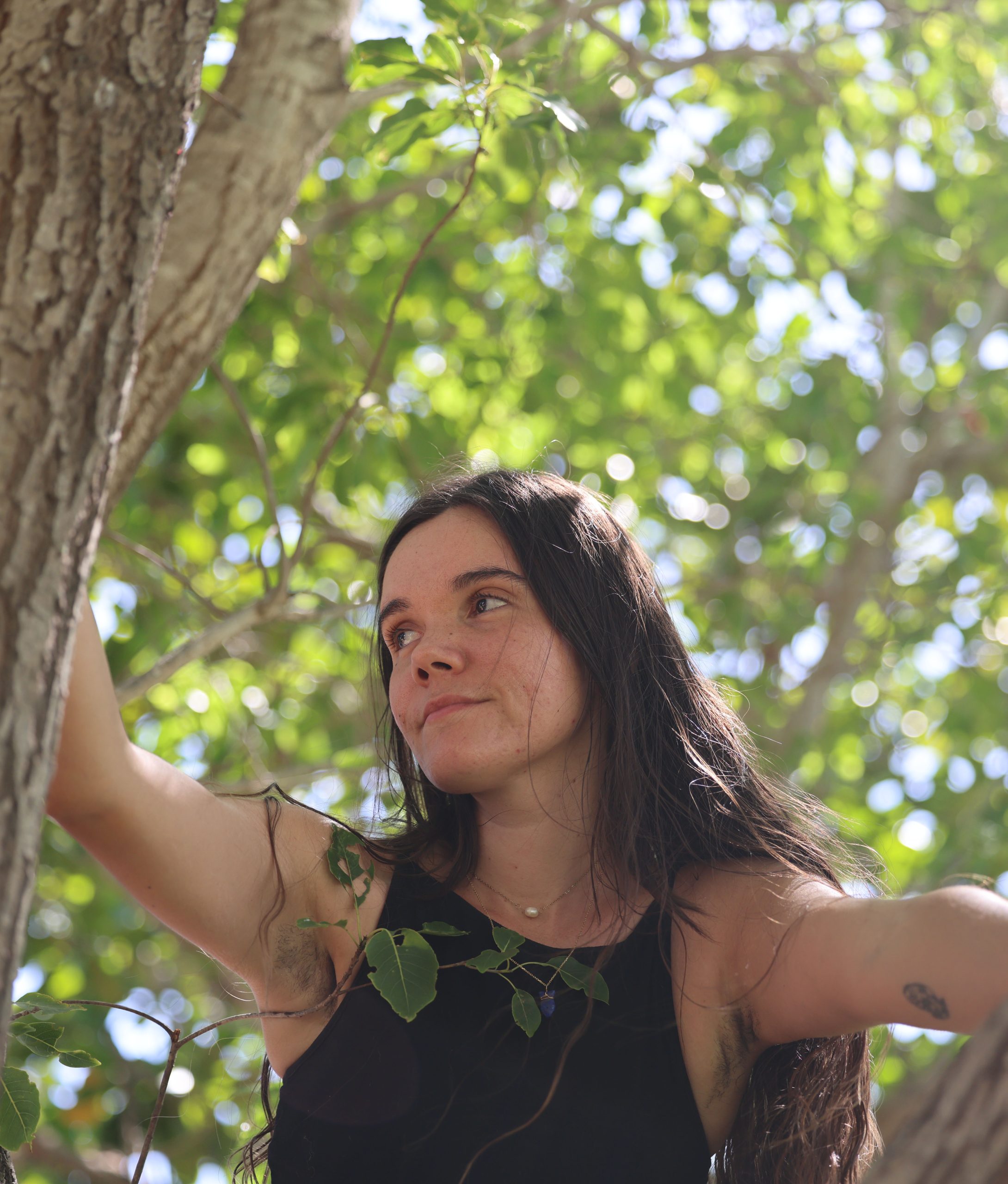
Project Description: The Elevate fund will support Tahjee Carter to complete writing and editing her first draft of ‘Koa: The first novel of an epic fantasy trilogy through a First Nations lens from Australia’s north’.
Artist bio
Tahnee is an emerging writer with ancestral ties to Bardi Jawi and Mayala Country on the Dampier Peninsula. Her writing is guided by her connection to the land and the ancient teachings it holds, which flow into both her fantasy and contemporary stories. In 2024, with support from the Creative Australia Arts Project Grant and the Regional Arts WA Next Level Fellowship, she has been working on her debut tribal fantasy novel, Koa. She was grateful to receive a residency at Varuna Writers House in 2023, as well as a scholarship for Magabala Books’ Creative Development program. After deciding to leave her fourth year of medical studies in 2020 to follow her passion for writing, Tahnee’s short story about that experience was chosen to be part of the 2022 SBS Emerging Writers’ Competition anthology, Between Two Worlds, published by Hardie Grant. Through her work, she aims to blend ancient cultural perspectives with universal themes, creating stories that speak to both personal and shared human experiences.
Vivienne Cleven (NSW)
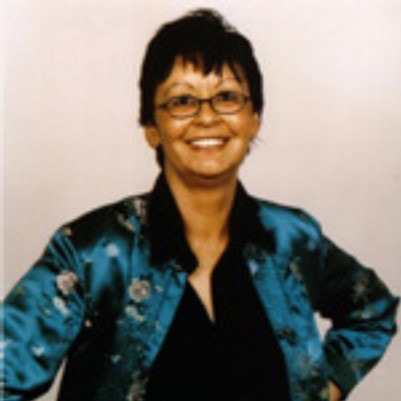
Project Description
The Elevate fund will support Vivienne Cleven’s creative development of fifteen short stories in collections titled, Headstrong, exploring themes of bigotry, hope, overcoming adversity, and identity.
Artist bio
Vivienne Cleven is a proud Kamilaroi/ Bigambul author who grew up in western Queensland.
In 2000, with the manuscript Bitin’ Back, Vivienne entered and won the David Unaipon Award. Her second novel Her Sister’s Eye won the Kate Challis RAKA Award in 2006. She has published articles and fiction in anthologies, magazines and journals.
Skye Cusack (VIC)
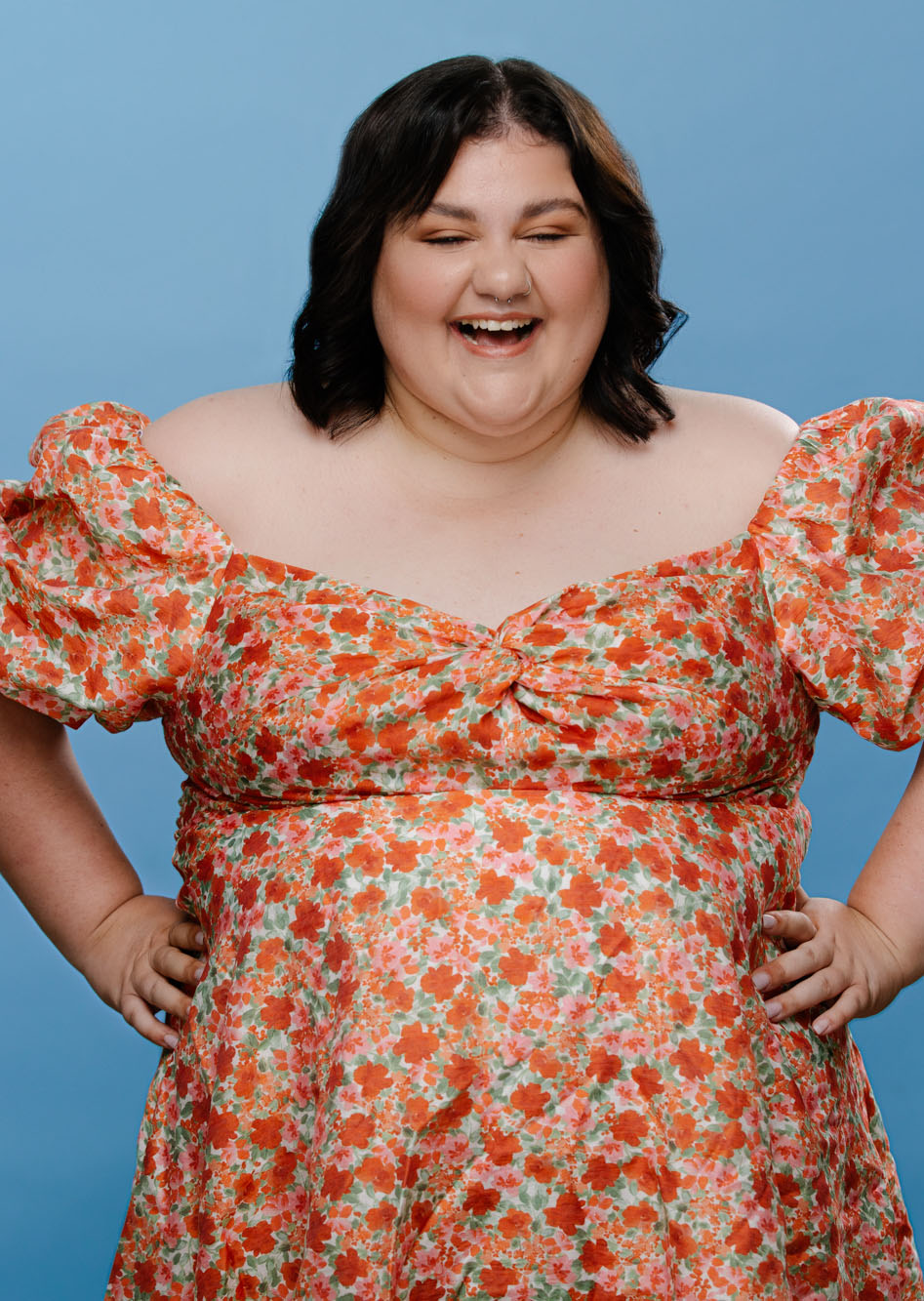
Project Description
The Elevate fund will support Skye Cusack to focus on the research and development phase of a queer rom com. This will include travel to her family in Yidinji country (Cairns, QLD) and mentorship from Aboriginal author Melanie Saward.
Artist bio
Skye Cusack is an emerging Dulgubarra-Yidinji creative writer living in Naarm. But this doesn’t mean that she’s new to writing – in fact, she’s been a copywriter for over eleven years. She is the founder of BluSkye Marketing, where she has worked with literary organisations such as The Wheeler Center, Emerging Writers’ Festival, and Forty South Publishing. She is well known for her role as Marketing Manager and Producer at Blak & Bright First Nations Literary Festival.
Skye likes to write things that make you laugh, cry, and call your therapist. Common themes in her writing include mental health, fatphobia, existential Blak crises, and people generally making fools of themselves. Her Indigenous New Adult novel manuscript was shortlisted for the 2024 black&write! Indigenous Writing Fellowships.
Image credit: Rachael Michelle
Kirrilly Dawn (NSW)
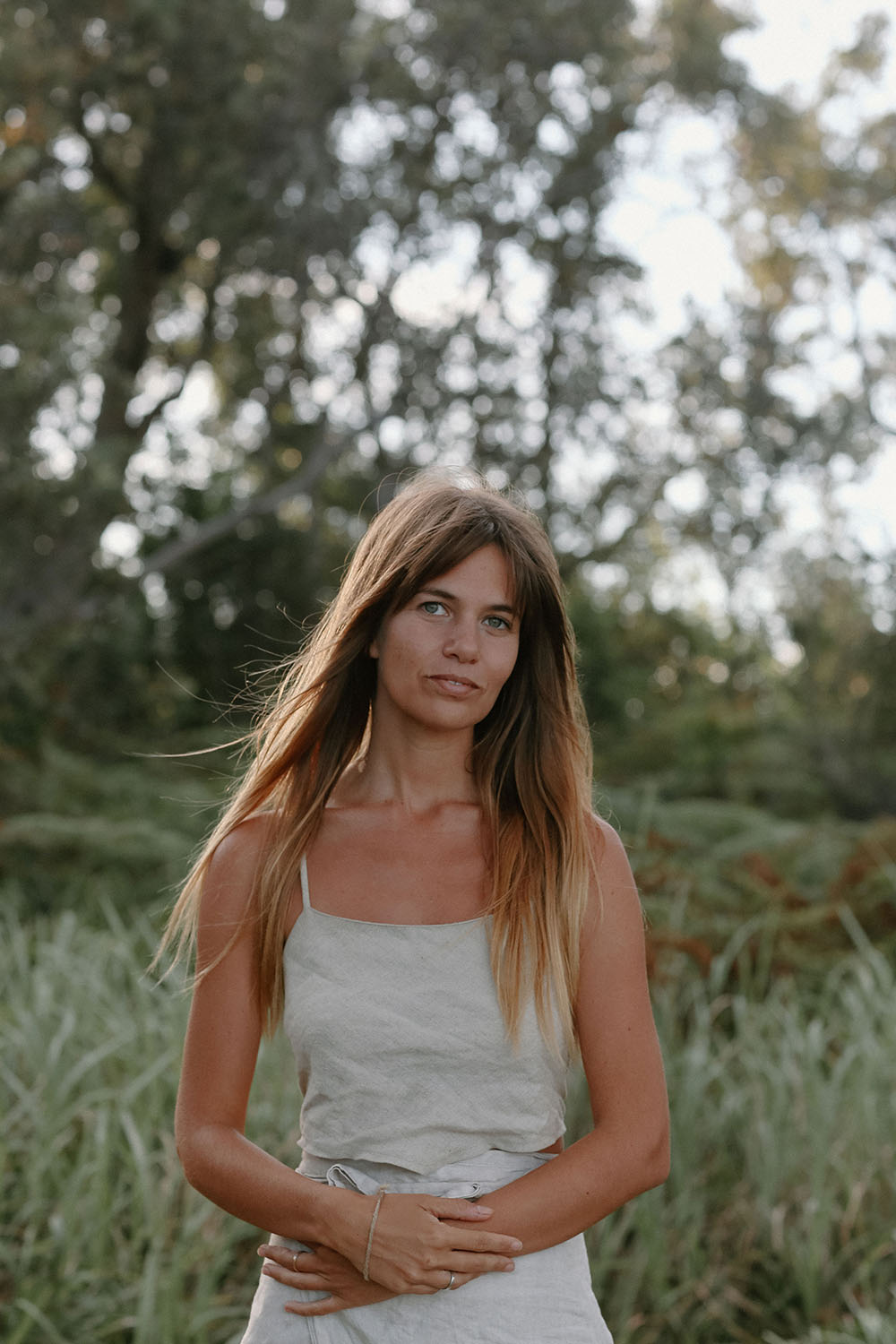
Project Description
The Elevate fund will support Kirilly Dawn’s opportunity to co-author Caring Our Way: an Indigenous approach to pregnancy, birth and postpartum in collaboration with The Returning Indigenous Corporation and Bundjalung chef, Mindy Woods.
Artist bio
Kirilly Dawn is a Barkindji woman, birth & postpartum doula, somatics facilitator, and multidisciplinary artist based on Bundjalung Country. Her practice and work centres around creating safe spaces to feel and be in the body, through movement, visual arts, and community work. Kirilly currently guides the Postpartum Care Program for The Returning Indigenous Corporation, providing culturally informed community care for First Nations women after birth with ancestral foods, body care, and advocacy. Kirilly is an exhibiting artist of Boomalli Aboriginal Artists Cooperative, and her writing has been published in print and online publications. Kirilly is a podcast host and producer with Pregnancy, Birth and Beyond, and co-hosted the Custodial Care podcast for The Koori Mail.
Image credit: Alix McKenzie
Alison & Bernadette Duncan (NSW)
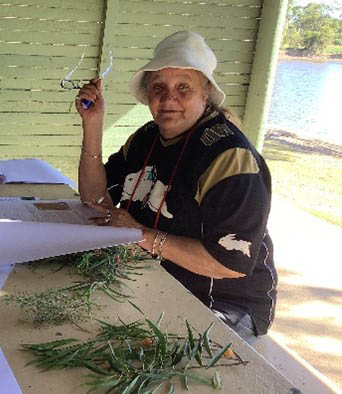
Project Description
The Elevate fund will support Bernadette and Alison Duncan, and Jodie Herden to develop and create the book, The Burrugarrbuu Benji Magpie Stories. Alison Duncan will share her stories; Bernadette Duncan will incorporate the Kamilaroi language, and Jodie Herden will craft the illustrations to develop the book.
Artist’s Bios
Bernadette Duncan (NSW)
Bernadette Duncan, Kamilaroi woman and language custodian with over 20 years’ experience in reviving Kamilaroi/Gamilaraay language in schools and community. Bernadette develops traditional healing practices with local plants she observed while growing up on Toomelah Mission. Bernnadette has worked with the Atlas of Living Australia to include Kamilaroi language and knowledge facilitates the revival, storage, protection, maintenance and sharing of Kamilaroi language and knowledge.
Alison Duncan, Storyteller
Alison Duncan is a local Elder and Storyteller, she grew up on Toomelah Mission in a family of 13 children. Her grandmother Hannah Duncan was a language speaker and a traditional healer. Alison loves to share her stories especially that connect people to country.
Alison’s stories of a Magpie she befriended, is incredibly special to her personally. She had tragedy in her life and through her friendship with this magpie “Benji’ she finds some comfort for her grief.
Image credit: Bernadette Duncan
Charlie King (NT)
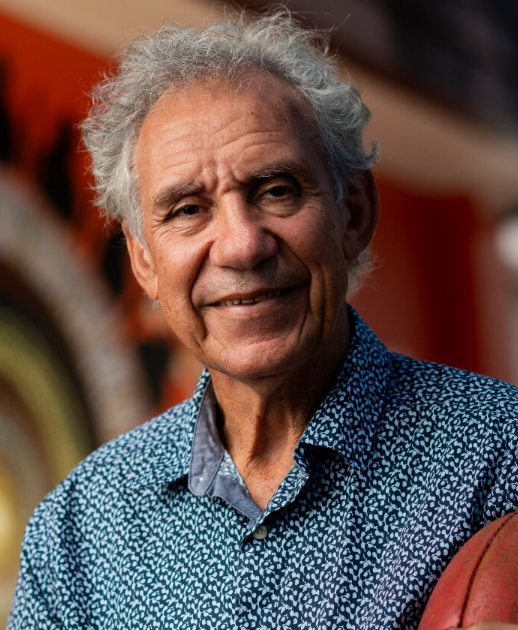
Project Description
The Elevate fund will support Charlie King’s research and development phase to grow his extraordinary family’s historical stories into a creative non-fiction book for broader publication.
Artist bio
Dr Charlie King AM is a veteran ABC broadcaster and human rights campaigner who has worked across the Northern Territory for more than 50 years. As a Gurinjdi man and second-generation Stolen Generations survivor, storytelling, justice and truth-telling is at the heart of everything he does.
Charlie is the founder of the anti-domestic violence campaign NO MORE and hosts ABC Grandstand, a role he has held since 1990. In 2006 he commentated the Commonwealth Games in Melbourne and the Olympic Games in Beijing in 2008, the first Indigenous person to do so. He has been recognised through a range of awards including NAIDOC person of the Year, Elder of the Year and Darwin City Council Citizen of the Year. He was then awarded NT Senior Australian of the Year 2019, became a member of the Order of Australia in 2021 for significant service to the Indigenous community of the NT and recently received an honorary doctorate.
Lay Maloney (NSW)
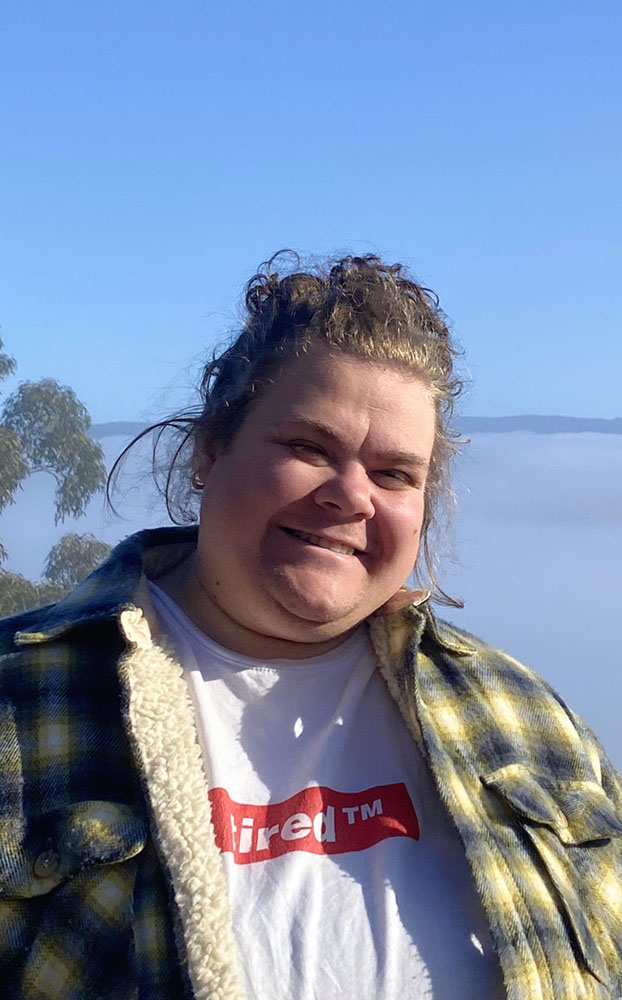
Project Description
The Elevate fund will support Lay Maloney’s research and development in self-lead residency on the country to Cairns, and their community at Yarrabah to collect cultural information and visit sites integral to the second instalment of a series of books called Chthonic.
Artist bio
Lay Maloney is a young genderfluid storyteller of the Gumbaynggirr and Gunggandji nations and South Sea Islander heritage based on Dunghutti Country.
Since 2020, Lay has made significant strides in poetry, speculative fiction, fantasy, and young adult literature.
Their debut novel, Weaving Us Together, won the black&write! award in 2022 and will be published by Hachette Australia in July 2025. Currently, Lay is focused on their second novel, Chthonic, supported by a Magabala Scholarship in 2023.
Lay was the Emerging Producer for the Blak & Bright First Nations Literary Festival 2024 and actively supports fellow First Nations writers. They received the First Nations Australia Writers Network (FNAWN) and Varuna Writer’s House fellowship to revise Chthonic. Lay is committed to truth-telling through fiction and advancing the Blak literary community.
Image credit: Steph Isbester
Bebe Oliver (VIC)
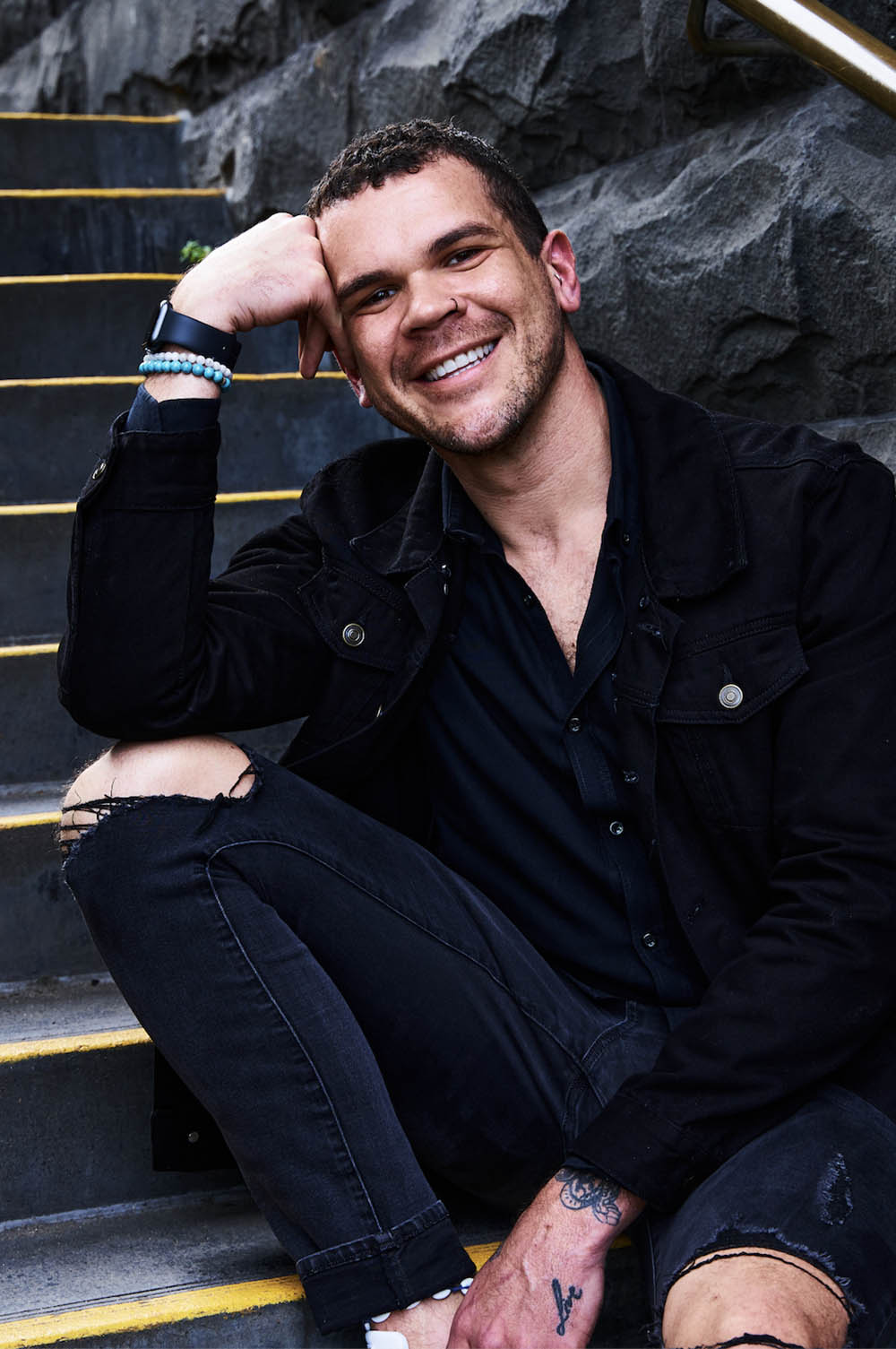
Project Description
The Elevate fund will support Bebe Oliver to write a body of literature that records the real voices and stories of the Aboriginal nations of the Kimberley, Western Australia. This will include a collection of written and visual pieces, consisting of poetry, verse, memoir, and photography. The completion of this project will result in a print publication, representing an exquisite collection of living culture.
Artist bio
Bebe Oliver is a Bardi Jawi award-winning author, poet, and illustrator.
From his early days as a classical pianist and composer, Bebe swiftly rose to prominence as a West Australian Young Person of the Year, before producing and directing theatre, dance, public art, and festivals across Australia, Aotearoa, and Europe.
As a leading advocate for Aboriginal advancement and self-determination, Bebe has collaborated with international entities including Aesop, Global Citizen, and World Pride to champion Blak stories and communities.
His debut poetry collection more than these bones (Magabala Books, 2023) has been celebrated for its raw, unflinching exploration of mental health and the human condition.
A writer, facilitator, and speaker living on the unceded land of the Kulin peoples, Bebe is deeply committed to the empowerment and visibility of Aboriginal and Torres Strait Islander creators.
He is the Artistic Director and CEO of Blak & Bright First Nations Literary Festival, and the Deputy Chair of Magabala Books, demonstrating his drive for literary excellence and cultural representation.
Bebe’s highly celebrated and widely published work explores love, loss, identity, the intersection of Aboriginal and gay existence, and the rich tapestry of place and Country, making him a compelling and transformative voice in contemporary literature.
Bebe’s newest book, if this is the end (Magabala Books, 2024) is regarded as a fearless and honest exploration of identity, and “a queer Blak classic”.
Image credit: Lexi ZQH
Lystra Rose (QLD)
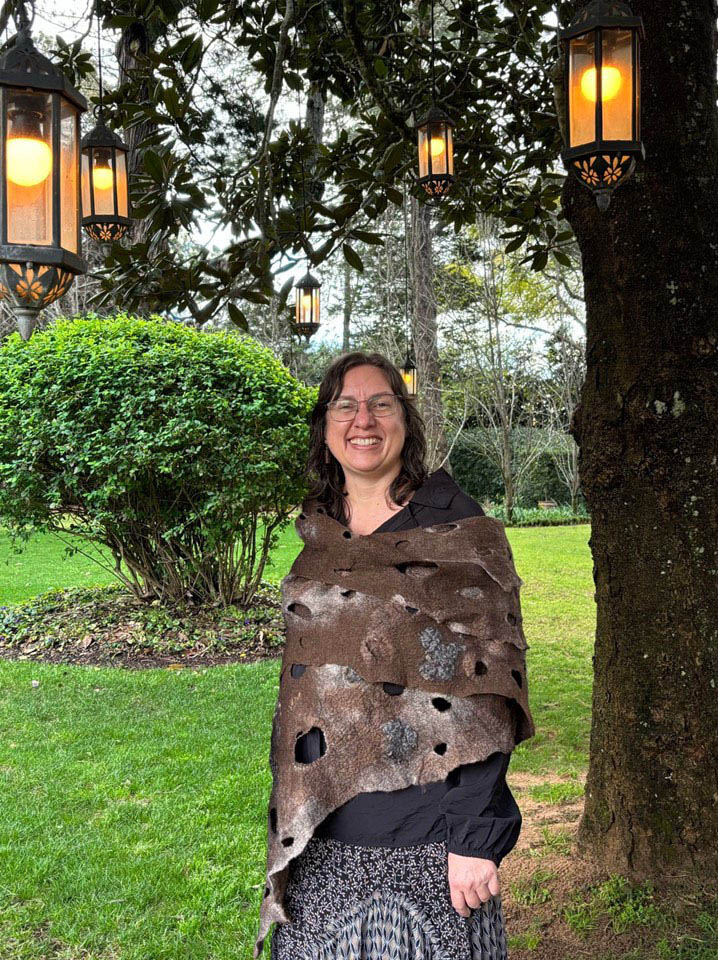
Project Description
The Elevate fund will support Lystra Bisschop’s (AKA Rose) research and complete the creative development of The Upworlding, the final book of a YA trilogy, which expands First knowledge from local to national to global. The trilogy will be the first of its kind: expanding local Indigenous knowledge from The Upwelling (Book 1) to national Indigenous knowledge in The Upwarping (Book 2) to global Indigenous knowledge in The Upwarping (in Book 3).
Artist Bio
Lystra Rose is an award-winning novelist of Guugu Yimithirr, Birri Gubba, Erub/Mua, and Scottish heritage who lives on Yugambeh-speaking Country (Gold Coast). Lystra is editor-in-chief of Surfing Life magazine—the first female editor of a mainstream surf mag in the world. Lystra implements a ‘cultural education by stealth’ methodology.
The Upwelling is Lystra’s debut novel, which collected seven awards including Winner of the 2023 NSW Premier’s Ethel Turner Prize for Young People’s Literature, Winner of the 2023 Victorian Premier’s Literary Prize for Indigenous Writing, Winner of the State Library of QLD’s 2018 black&write fellowship (manuscript), and Shortlisted for the 2023 Prime Minister’s Literary Awards for Young Adult Literature.
Lystra is a 2024 CYA ARA Historical Fiction judge; she was also awarded a 2024 Keesing Studio Paris Residency with Creative Australia and Cite internationale des arts. Lystra is Griffith University’s 2024 Winner: First Peoples Alumnus for Arts, Education and Law.
Image credit: Ray Bisschop
Desirai Saunders (QLD)
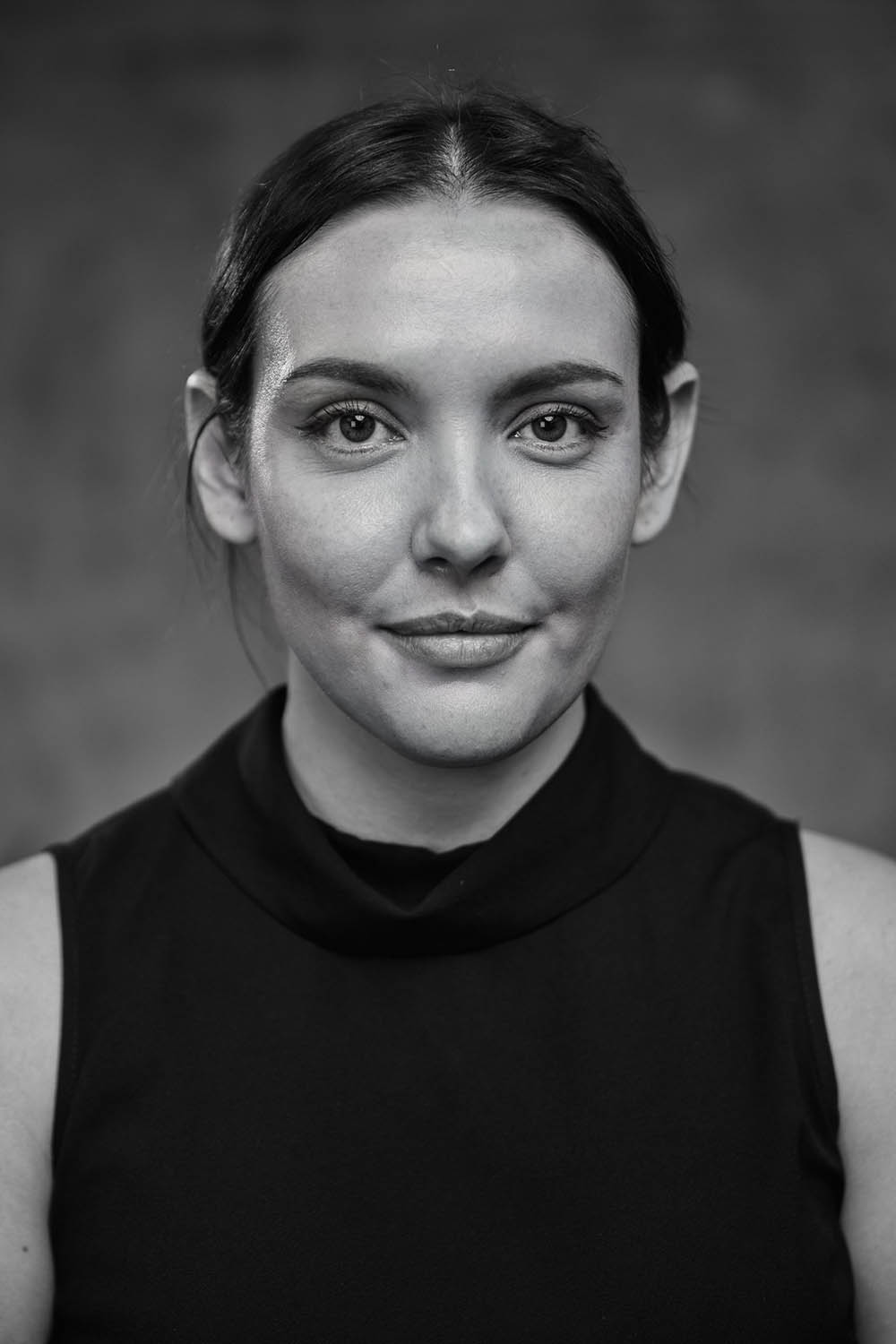
Project Description
The Elevate fund will support Desirai Saunders in research and development to create a first draft of Dreamwalkers, a fantasy narrative following three sister-cousins who inherit ancestral magic and must race against time to save their community.
Artist bio
Desirai Saunders is a proud Gunggari woman with family ties to Mitchell, QLD. A First Nations digital illustration artist, Desirai currently resides in Brisbane. She expresses her connection to culture and urban identity through a blend of traditional and modern elements, celebrating the intersection of traditional culture in a modern world. Her art focuses on creating powerful and inspiring representations of Blak women, aiming to uplift and resonate with those who view her works.
Desirai has had the opportunity to collaborate with brands such as Nike, Apple, Canva, and Adobe. Recently, she illustrated a children’s book written by Bianca Hunt, published by Hardie Grant. Through her creative career, she continues to advocate for the careers and cultural contributions of First Nations artists while celebrating her own vibrant artistic expression.
Image credit: Josef Joe Ruckli
Adam Thompson (TAS)
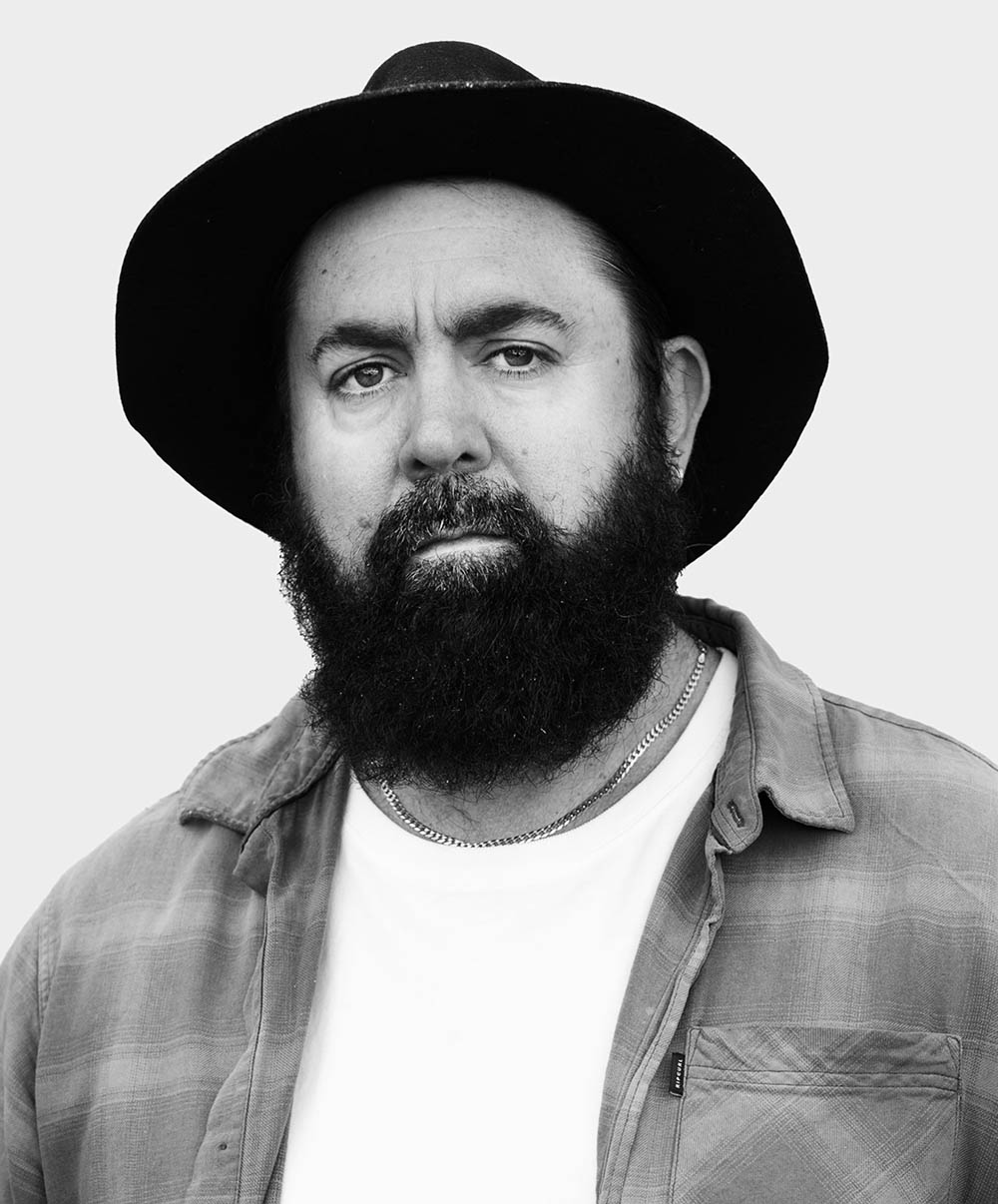
Project Description
The Elevate fund will support Adam Thompson to complete the research and concept development, and craft writing of 8 stories, that share the rich tapestry of Pakana culture and contemporary life.
Artist bio
Adam Thompson is a Palawa (Tasmanian Aboriginal) writer and screen producer from Launceston, Tasmania. His poetry and fiction have been published in various literary journals and anthologies. His debut collection BORN INTO THIS (University of Queensland Press) was shortlisted for the USQ Steele Rudd Award (Short Story Collection category), the 2021 Age Book of the Year Award, The Readings Prize 2021: New Australian Fiction, and longlisted for the 2022 Tasmanian Premier’s Literary Awards (Fiction category). In 2021, BORN INTO THIS won the International Story Prize: Spotlight Award. In 2022, he released a children’s book in the Little J & Big Cuz series, THE STORMY NIGHT (Hardie Grant).
Adam also works in screen. He has written several episodes of the Australian children’s animation, Little J & Big Cuz, and was shortlisted for an AWGIE in 2022. Adam has undertaken screen producer attachments with Film Art Media and GoodThing Productions, and in 2022, he launched the first Palawa screen production company, Kutikina Productions, of which he is a co-director.
Under Kutikina, Adam has co-written and co-produced the short film, My Journey, which featured at the 2024 St Kilda Film Festival and was nominated for an Australia’s Top Short Films award. Adam then went on to co-write and co-produce the 1-hour TV drama, Moonbird, for SBS/NITV (TX in early 2025).
Image credit: Scott Cunningham
Ellen van Neervan (QLD)
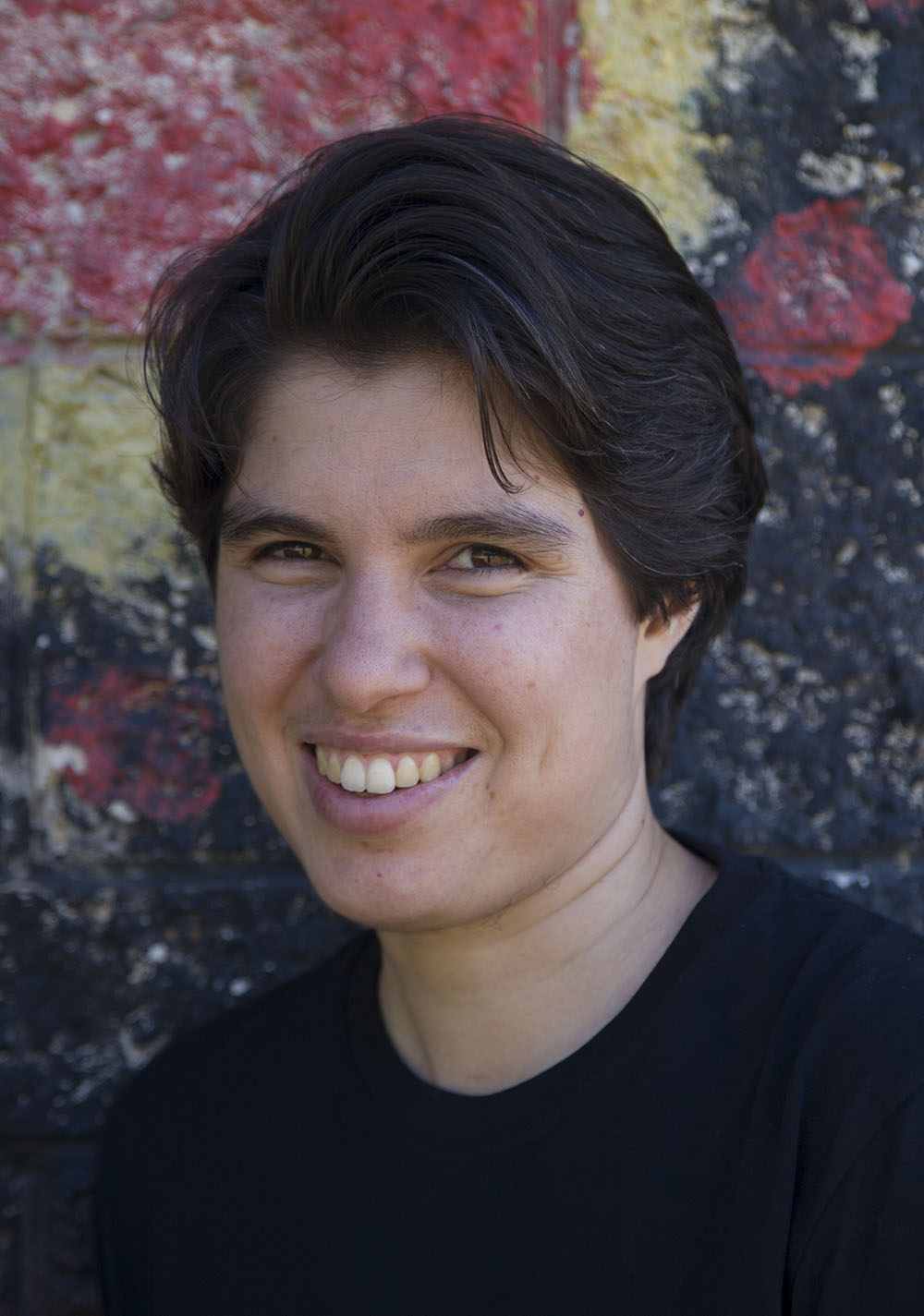
Project Description
The Elevate fund will support Ellen van Neervan in the creative development of Ruby’s Web, a middle-grade novel that questions, ‘What is racism?’ and ‘Why is it harmful?’ for young people, particularly in a social media age.
Artist bio
Ellen van Neerven is a writer, editor, and literary activist of Mununjali Yugambeh and Dutch heritage. Ellen has authored two poetry collections, Comfort Food and Throat, one work of fiction, Heat and Light, and creative non-fiction, Personal Score, which received the 2024 Victorian Premiers Prize for non-fiction. Ellen is also the editor of many anthologies including Homeland Calling: Words from a New Generation of Aboriginal and Torres Strait Islander Voices, Flock: First Nations Storytelling Then and Now and Unlimited Futures (with Rafeif Ismail).
Heat and Light won the David Unaipon Award and the Dobbie Literary Award. Throat won three prizes at the 2021 NSW Premiers Literary Awards including Book of the Year, the Kenneth Slessor Prize, and the Multicultural Award.
In 2024 Ellen debuted their first play swim with Griffin Theatre Company to audiences on Gadigal, Yugambeh and Wiradjuri land.
Image credit: Anna Jacobson

